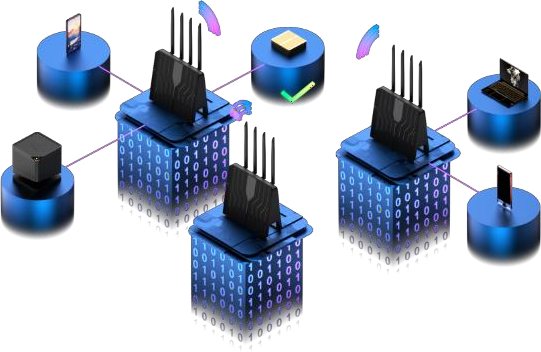9.3 KraterPool
KraterPool is a platform that centralizes the validators and smart devices and that is managed by a Guardian Node. The role of this platform is to integrate smart devices into the Xiden network with the purpose of ensuring them an environment in which to execute certain functions.
The KraterPool is divided into two categories:
9.3.1 Private KraterPool
- This private KraterPool can be owned by a single entity and cannot be customized for the reward distribution to each device or validator based on each of their contributions.
- A single wallet is attached to the platform for the transfer of XDEN for POS but also to deposit the rewards obtained as a result of validations executed or resources integrated.
- It allows the integration of 10 validators and 10 smart devices for the SDR layer.
- It can be managed by a single Guardian Node that makes the connection to the RMNode.
- Boost Power: Up to 10% * Total Cycles
9.3.2 Public KraterPool
- It is available starting with the Meteora Age.
- The platform can be owned and administered by an entity or a DAO.
- SDR validators and devices can organize into groups and a wallet can be attached to each group.
- The platform has a central wallet managed by a smart contract that automatically collects XDEN for POS. Each group wallet can control the quantity it sends to the POS wallet.
- Reward distribution is automatic and is managed through the smart contract.
- Public KraterPools can be managed through decentralized voting by all the participants of that particular KraterPool.
- The management and connection to an RMNode is made through a single Guardian Node.
- It allows the integration of 20 validators and 20 smart devices for the SDR layer.
- Boost Power : Up to 20% * Total Cycle
9.3.3 KraterPool Functionality
To open a KraterPool a user or an organization needs an active and fully functional Guardian Node. The Guardian Node establishes a connection with an RMNode.
To activate a KraterPool the user must attach a wallet containing 1000 Xden in Locked or Unlocked version that will be sent and locked in the POS Layer. Having these conditions met, the Guardian Node is automatically registered as a validator in the KraterPool. For the pool to be active, the Guardian Node needs to be maintained online at all times in order to ensure its connection to the RMNode.
More validators that can be non-Guardian Nodes (as per SDR layer) can be integrated into the KraterPool. This will increase the validation power and will allow owners to perform more validations and to receive a larger amount of XDENs, depending on the system’s difficulty.
The KraterPool also has the function that allows smart devices to make available their resources for the SDR Layer. KraterPool is actually a management platform that distributes jobs from DApps to embedded devices. The validation devices that are integrated in the KraterPool are under the direct management of the platform in the SDR Layer.
Non-validating smart devices can only be integrated into the KraterPool for SDR Layer via Guardian Nodes that are part of the Spectralis Network. These devices boost the overall computing power. Each device integrated in the KraterPool increases the total validation power by 1% so that the Kraterpool will receive more rewards for the resources integrated in the SDR layer.
The KraterPool connection with the integrated devices both as validators and in the SDR Layer but also with Guardian Node and RMNode is a secure connection empowered by the VOBP secure communication protocol. Strong cryptographic protocols are used so that all data sets are secure. Devices communication is P2P and uses Matrix ID with unique encryption keys for each data packet transferred. Communication is performed automatically between devices and encryption key management is done for each device so the same encryption is not used for multiple devices or multiple communication sessions.
Each device generates its own protocol to securely transmit information to any other device. After each session, the encryption keys are destroyed so that there is no risk of compromising data packets that may have been intercepted by various methods.
